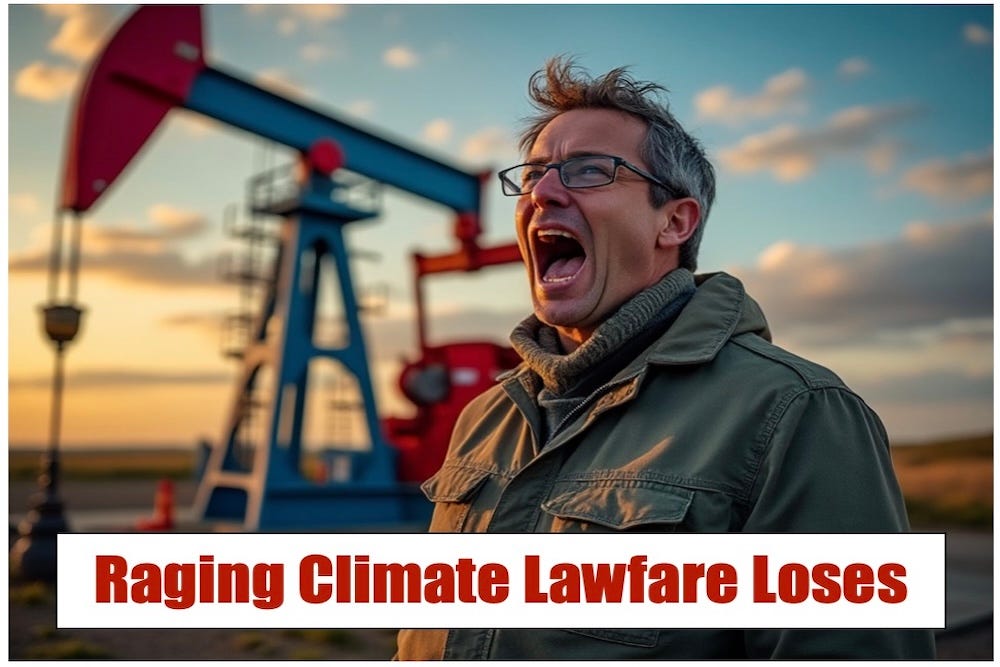Judith Curry has put up a great post by Lucas Bergkamp on her site today. Titled as “The Climate Case of the Century,” it delves into the significance of a case brought against Shell by some European environmental special interests. Shell won, and it's a big win, but the climate lawfare the case has heretofore spawned continues.
Here are a few excerpts from the article, which should be read in full to get the big picture:
On the 12th of November, the Hague Court of Appeal ruled in the “climate case of the century” that Milieudefensie (“FoE”) filed against Shell in 2019. FoE demands that Shell reduce emissions throughout the entire chain by at least 45% by 2030. The foundation “Man & Environment” (M&E) joined the case to represent the interests of Dutch citizens.
The Court of Appeal was not impressed by FoE’s “go green or go extinct” rhetoric and rejected its claims. Nevertheless, the Court of Appeal’s ruling leaves much to be desired and did not eliminate the threat of activist NGOs launching climate cases to effect “system change,” i.e., set aside democracy, subordinate citizens and destroy the economy.
Although M&M had offered strong rebuttals with expert reports, the Court of Appeal uncritically adopted many of FoE’s factual statements about the urgency and seriousness of the climate problem. In doing so, the Court relied on the authority of the IPCC and the alleged “consensus” that would emerge from their reports, in particular the SPMs.
The Court not only took the IPCC reports as irrebuttable proof, but also attributed normative force to them. For example, the Court ruled that climate scientists have determined that the average temperature on earth may not rise by more than 1.5 degrees. In doing so, the Court, like the Dutch Supreme Court, ignored that science cannot set norms and that scientists are not authorized to set social standards. The Dutch judiciary’s scientistic tendency is extremely worrisome and does not bode well for future climate-related judgments…
FoE lost the case based on two lucid moments of the judges. FoE had demanded that Shell reduce scope 1, 2 and 3 emissions. With regard to scope 1 and 2, the Court of Appeal ruled that Shell had committed itself to this objective and is on track to achieve it, so that claim was rejected.
With regard to scope 3 emissions, the Court of Appeal concluded that neither the law nor climate science sets specific reduction standards for a company such as Shell…
As the Court confirmed, there is no reason to believe that a reduction obligation imposed on a specific company will have any positive effect: if Shell sells less oil and gas, other suppliers will simply take its place and any “climate gain” will be illusory.
In line with the human rights theory of ‘progressive realization’, the court-made right to protection against ‘dangerous climate change’ is slowly but surely being realized. Two steps forward, one step back: first governments, then companies, then a specific reduction percentage, and then no such percentage.
This week, it was a step back, but the District Court’s verdict in first instance has already had its effect. With that verdict in hand, many other lawsuits have been launched and the climate movement has been able to persuade the European Union to oblige companies to implement a “climate transition plan” in accordance with 1.5 degrees. Judges have learned rapidly how to play the political climate game…
A battle has been won, but the climate war will rage on. Activist NGOs will be able to derive new legal bases from the Court’s ruling for further climate cases…
All in all, the ruling of the Hague Court of Appeal is an important first step towards restoring rationality and balance in judicial decision-making in climate cases. The rejection of the case against Shell will have ripple effects on many other climate cases throughout the world, and should cause the EU to rethink the obligation for companies to implement a climate transition plan consistent with 1.5C.
In all things climate, to use a Chinese proverb, “the journey of a thousand miles begins with one step.”
The Europeans, of course, are trendy in the extreme. Class prejudice runs deep on the continent of our first ancestors, and elites always hang together, coalesced around protecting their power and privileges. So, it's hardly surprising the court in this case would treat IPCC pronouncements as holy writ, but at least some common sense prevailed, which is a start on the journey to banishing climate foolishness and getting down to real science, risk management, and adaptation. I suspect that's exactly why Judith Curry published the article!
#JudithCurry #Climate #TheHague #Shell #AppealsCourt #ClimateLawfare






Thanks for the heads-up on the article on Judith's site.
It’s a start but fully agree the battle is going to be very difficult. 😞